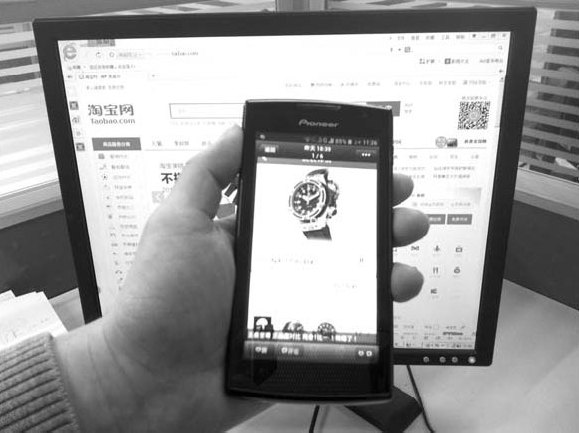When Changchun resident Sun Qi recently logged onto his smartphone's WeChat instant messaging app, he found he had been friended by something called the Lang Ge Luxury Outlet.
In their album he saw many pictures of world-class branded luxury goods tagged "delicate knockoffs".
After a short conversation, Sun ordered a watch priced 850 yuan ($134), and transferred the money to a requested bank account because Lang Ge did not accept other payment means.
When the watch arrived, Sun was disappointed to find that it was totally different from the picture, but the seller refused to take it back and dropped contact.
|

The smartphone app WeChat is becoming a new distribution channel for fake luxury goods. Hao Nan / China Daily
|
Developed by Chinese IT giant Tencent Technology Co, WeChat has won immense popularity among increasingly wired smartphone users. Copycat dealers have also found it very useful.
Sun is not alone. A woman surnamed Yang in Xiangtan city, Hunan province recently spent 1,780 yuan to buy a "Louis Vuitton" bag from a WeChat friend. She was satisfied with the bag's quality in every detail including the stitching and labels, but failed to check out its source on the LV website using the bag's ID number.
She said all the products her WeChat friend sold claimed to be "counter goods" or the "original version", but luxury expert Ouyang Kun noted that such claims only imply one thing - they are fake.
Luxury retailer Liu Haibo said that although some luxury goods have different prices in and outside China due to tariff duties or other reasons, the price overseas should be at least 60 percent of the cost in a Chinese store.
According to a report on the website of People's Daily, faked luxury goods on WeChat are usually priced at only 10 or 20 percent of genuine products in the stores. For some top-brand watches, the price could be just 0.1 percent of the real thing.
"Many illegal businessmen are moving their operations from the Internet to mobile software like WeChat because the domestic intellectual property authorities have taken increasingly severe actions against counterfeits on the online shopping portals like Taobao," said Zhong Ping, secretary-general of the Consumer Association of Changchun.
Zhong said either producing or selling such counterfeited products is illegal.
"Supervision authorities are responsible for the production sector, and in the distribution field it's the duty of the industry and commerce administration," she said. "Those authorities must make more effort to leave no room for copycat makers and sellers to survive."
She also suggested consumers increase IP awareness so there is no market for faked goods.
People's Daily quoted an executive from WeChat's developer Tencent as saying that the software now uses a mechanism that combines machine filtering and user reports to check the legality of information and when illegal behavior by an account is found, they can immediately ban it.
[email protected]
(China Daily 10/30/2013 page17)

